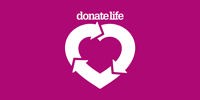Post transplant
As the journey to transplant is different for every patient, it makes sense that the journey post-transplant will be different too. There are many areas of life that are impacted and it should be realised that patients' management of their own health post-transplant should be an ongoing, active responsibility.
Outpatient follow up
After discharge from hospital, you will have an appointment made to visit the Transplant Outpatient Clinic. Initially, this will be three times per week and then these visits will decrease as your condition stabilizes. The transplant clinic nursing staff will perform your blood tests, any wound dressings or intravenous medication required and make appointments for your regular biopsies and also for various tests that need to be performed to monitor your progress. This follow up is usually the most intense for the first three months after surgery, lessening as your condition stabilizes. Generally, follow ups after the first year are 2-3 months apart for lung transplant patients and even less for heart transplant patients.
Rehabilitation and education
Patients are required to attend weekly education sessions and thrice weekly rehabilitation physiotherapy sessions for the first three months following surgery. The education sessions are designed to teach you all about your new medications, possible complications and how to effectively manage your health going forward. The rehabilitation sessions are designed to help your body recover from the immediate after-effects of surgery and likely poor health, for perhaps years, leading up to transplant.
Concentration and memory
Patients frequently notice difficulty with their memory and concentration in the weeks following surgery. This slowly improves and over a period of two to three months should return to normal.
Tiredness
This is common after all forms of surgery. You should increase your activity slowly, avoiding sudden bursts of activity such as running or climbing stairs quickly. As a general rule, physical activity is good for your heart and lungs and the recovery of muscle strength.
Moods
It is common to have mood swings after major surgery and these can be most pronounced around the time of discharge. The drugs, particularly 'prednisolone', can also have an effect on mood. If they persist or you feel they are effecting your recovery, please talk to the clinic nurses, your doctor or your social worker.
Activities
Each person's rate of recovery is different and you should use your discretion as to what you are capable of doing. If you are concerned about undertaking any activity, consult the occupational therapist or physiotherapist. In the first few days following discharge, you will probably tire very quickly and need to limit visitors.
You'll benefit from a rest during the day. Light daily tasks should be commenced within the first week, e.g. folding light washing, making a cup of tea/snack, washing dishes. Gradually introduce more tasks into your daily routine. You'll need to be aware of your individual level of physical endurance and grade the introduction of tasks appropriately, which the occupational therapist can guide you with.
Major restricting factors for participating in domestic tasks are usually muscle fatigue, poor endurance and lack of confidence. Due to the time required for the wound and bone to heal, you should avoid lifting heavy weights, for example anything heavier than a full kettle or moving furniture for two months after the transplant.
Use of heavy vibrating machinery, for example, vacuuming, lawn mowing and power tools should be avoided for three months after transplant. You can commence shopping and other tasks in the community as soon as you feel capable, keeping in mind restrictions in lifting weights. You can begin to use public transport at approximately 2-3 months post-transplant, grading from no peak to peak times.
Leisure activities can also be commenced taking into account your individual physical endurance, lifting restrictions and confidence and following the guidelines for warm-up, period of activity and cool-down. Begin suitable leisure tasks as soon as possible for self esteem and life enjoyment.
Return to work or vocational goals are usually addressed from four to six months post transplant.
Your long term future
Your commitment to look after yourself after transplant is important for a successful outcome after discharge and for the rest of your life. Keeping this commitment will require that you do the following:
- take your medications as prescribed by the doctors
- keep all your medical appointments including clinic visits and biopsies
- call the transplant team about potential problems
- do not abuse your body by smoking, drinking or using non-prescribed drugs
- adhere to dietary guidelines and restrictions as instructed by the dietician
- adhere to exercise guidelines as prescribed by the doctors and physiotherapist.




